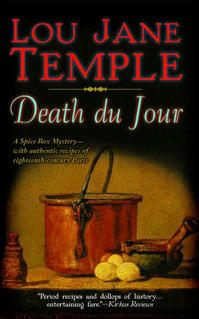Bookstore
AMATEUR SLEUTH/ HISTORICAL/
CULINARY MYSTERY
CULINARY MYSTERY
DEATH DU JOUR
Read A Review:
Fanny Delarue is a young cook for a wealthy family in Paris in 1790. Her mother gives her a Spice Box. She treasures it.
There is a lot of political unrest at this time. Then a neighboring chef, Etienne de la Porte, is found dead under suspicious circumstances. She and her head chef, and lover, Henri, had been taking classes from Etienne. He was also Henri's mentor. Soon after Fanny and Henri's boss leaves the area and dismantles his house and lets all the servants go.
Henri and Fanny end up staying at the master's house because Henri has been injured in the unrest. Then Henri disappears. Fanny searches for him and finds herself in some dangerous situations.
Can Fanny find Henri and Etienne's killer? Are they the same person? Can she stay safe while investigating?
This is the second in the Spice Box series. I liked Fanny and Henri. Even though historical mysteries are often hard for me to get into, I don't find that with this series. The author writes in such a way that I almost forget it's a historical mystery. I just get into the mystery. I found this time period to be very interesting. Not something I knew a lot about. I recommend this book.
Dawn Dowdle
Fanny Delarue, cook for a rich Parisian family, suffers distress when her culinary mentor is brutally murdered. Fanny determines to unravel the mystery surrounding his death, fearing that if she doesn't solve the riddle of the crime, her position and her future lie in jeopardy. The mystery unfolds against the backdrop of that very brief period of revolutionary euphoria immediately following the fall of the Bastille and before the onset of the Terror. This was the moment when restaurants began proliferating as noble cooks moved out of palaces and chateaus to feed the nascent industrial class. Temple, herself a chef, takes great delight in the historical culinary details, and those of similar taste will follow her savory descriptions. The characters' psychologies may betray some anachronistic treatments, but the historical detail of -eighteenth-century Paris remains faithful. Temple tops off her mystery with a recipe for marinated leeks and two desserts that reflect the period and that may be readily reproduced by a competent cook.
Mark Knoblauch, American Library Association. All rights reserved
Fanny Delarue is a young cook for a wealthy family in Paris in 1790. Her mother gives her a Spice Box. She treasures it.
There is a lot of political unrest at this time. Then a neighboring chef, Etienne de la Porte, is found dead under suspicious circumstances. She and her head chef, and lover, Henri, had been taking classes from Etienne. He was also Henri's mentor. Soon after Fanny and Henri's boss leaves the area and dismantles his house and lets all the servants go.
Henri and Fanny end up staying at the master's house because Henri has been injured in the unrest. Then Henri disappears. Fanny searches for him and finds herself in some dangerous situations.
Can Fanny find Henri and Etienne's killer? Are they the same person? Can she stay safe while investigating?
This is the second in the Spice Box series. I liked Fanny and Henri. Even though historical mysteries are often hard for me to get into, I don't find that with this series. The author writes in such a way that I almost forget it's a historical mystery. I just get into the mystery. I found this time period to be very interesting. Not something I knew a lot about. I recommend this book.
Dawn Dowdle
Fanny Delarue, cook for a rich Parisian family, suffers distress when her culinary mentor is brutally murdered. Fanny determines to unravel the mystery surrounding his death, fearing that if she doesn't solve the riddle of the crime, her position and her future lie in jeopardy. The mystery unfolds against the backdrop of that very brief period of revolutionary euphoria immediately following the fall of the Bastille and before the onset of the Terror. This was the moment when restaurants began proliferating as noble cooks moved out of palaces and chateaus to feed the nascent industrial class. Temple, herself a chef, takes great delight in the historical culinary details, and those of similar taste will follow her savory descriptions. The characters' psychologies may betray some anachronistic treatments, but the historical detail of -eighteenth-century Paris remains faithful. Temple tops off her mystery with a recipe for marinated leeks and two desserts that reflect the period and that may be readily reproduced by a competent cook.
Mark Knoblauch, American Library Association. All rights reserved

